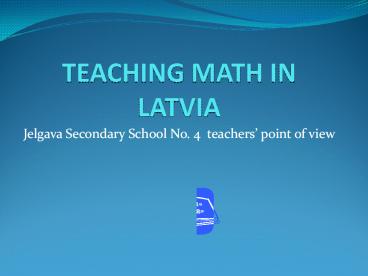TEACHING MATH IN LATVIA - PowerPoint PPT Presentation
Title:
TEACHING MATH IN LATVIA
Description:
At the end of the 9th grade: can operate with real numbers in mind, on paper and with calculator, solve linear equations, quadratic equations and inequalities, – PowerPoint PPT presentation
Number of Views:67
Avg rating:3.0/5.0
Title: TEACHING MATH IN LATVIA
1
TEACHING MATH IN LATVIA
- Jelgava Secondary School No. 4 teachers point
of view
2
Main documents that control math teaching in
Latvia
- Latvia State Educational Law,
- State Standart of Basic Education,
- School Subject Curriculum.
3
Math teaching stages
- Grade 1-3 (age 7-9),
- Grade 4-6 (age 10-12),
- Grade 7-9 (age 13-15),
- Grade 10-12 (age 16-18).
4
Abilities and comprehensive skills that students
have to know and manage at the end of each stage
5
At the end of the 3rd grade
- Can operate with three digit numbers in mind, on
paper and with calculator, - Pupils have an idea about regular
solids/geometrical basic shapes(rectangle,
triangle,circle), - Solve problems with the practical meaning,
- Can obtain information from tables and charts,
- Use the maths terms.
6
At the end of the 6th grade
- Operations with rational numbers in mind, on
paper, - Idea about regular solids/geometrical basic
shapes features/ measurement/quantity, - Have skills to solve practical problems,
- Can obtain and summarize information fro
different issues, - Can discuss logically, notice regularities and
join them with the mathematical justifications, - Can work in groups in math projects.
7
At the end of the 9th grade
- can operate with real numbers in mind, on paper
and with calculator, - solve linear equations, quadratic equations and
inequalities, - can solve system of equation and inequality with
one or two fluent, - recognize, can draw and analyze functional
relevance and use them in problem solving, - Solve practical problems and in their solving use
algebraically and statistical methods, - Use algebraically terms, can fortify.
8
- master features and qualities of the geometrical
shapes, - solve practical problems and in their solving use
geometrical methods, - use geometrical symbols and terms in solving
problems, - can construct accurate mathematical
justifications.
9
In grades 10- 12 students master
- skills to solve equations and inequalities with a
module, - to solve logarithmic, exponent and irrational
equations and inequalities, - to solve trigonometric equations and inequalities
, - vectors, operating with them in geometrical and
co-ordinate format, - manage with geometrical transfigurations,
- Essential of combinatorics and theory of
probability, - Solve problems with dimensional shapes prism,
pyramid, cone, cylinder.
10
There is special attention to research work in
math lessons.
11
Evaluation
- In math there are two ways of evaluating
- formative evaluating pass(i), fail (ni)
- for homework, small/quick works,
- summative evaluating 10 grades system
- for tests
12
The system of grades
- A ten-point system of grades, where the lowest
pass mark is four, is used to evaluate pupils and
students at all of Latvias secondary schools and
most of the higher education institutions as
well. - Grade Interpretation
- 10 Outstanding
- 9 Excellent
- 8 Very good
- 7 Good
- 6 Almost good
- 5 Average
- 4 Almost average
- 31 Unsatisfactory
13
During the nine-year basic and secondary
education period there are following state tests
- State test at the end of grades 3 and 6,
- state examination, at the end of grade 9,
- state examination, at the end of grade 9

